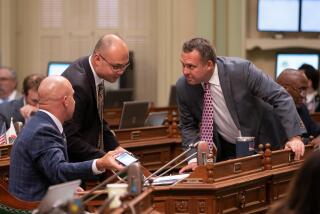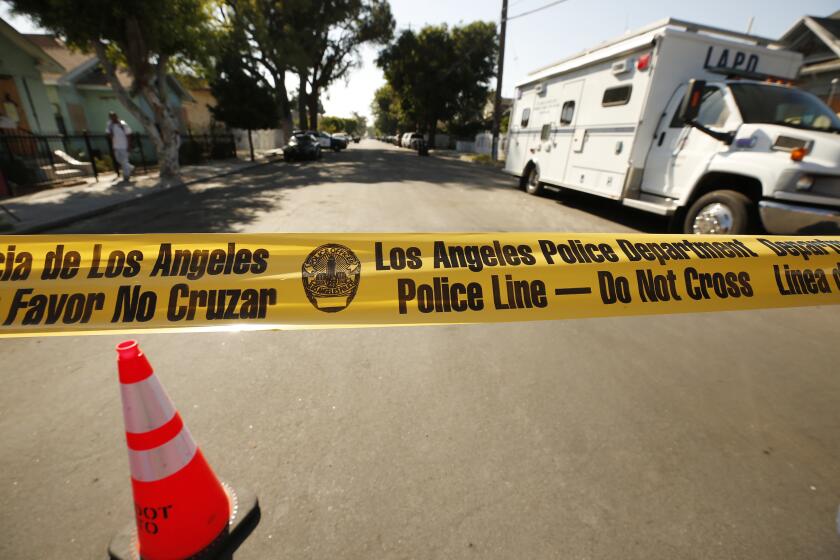Moriarty Tells of ‘2-for-1’ Deal for Young : Convicted Corrupter Is First Witness in Trial of Ex-Assemblyman
Testifying as the first prosecution witness in the trial of former Norwalk Assemblyman Bruce E. Young, convicted political corrupter W. Patrick Moriarty Wednesday described a special “two-for-one” investment offer in a condominium project he made to Young and two other public officials.
Moriarty, 54, serving a seven-year prison term on fraud and corruption charges, said he offered both Young and Assembly Speaker Pro Tem Mike Roos (D-Los Angeles) returns of $100,000 on investments of $50,000 in 1981 in connection with a Baldwin Hills condominium project that failed.
Young had made his investment in the condominium project in 1979 with only Moriarty’s promise that he would receive a “suitable return” on the investment, Moriarty said. But he added that he sweetened the offer to Young two years later after the former legislator helped recruit Roos as an additional investor.
That same year, Moriarty, former owner of the largest fireworks company in the United States, began a successful crusade with Young’s help to push a bill through the Legislature that would have legalized so-called “safe and sane” fireworks throughout California.
The bill ultimately was vetoed by former Gov. Edmund G. Brown Jr. Moriarty estimated Wednesday that if it had become law it would have doubled the gross profits of his company, Pyrotronics Corp., from about $8 million a year to more than $16 million.
In addition to Young and Roos, Moriarty said a third “two-for-one” investment offer was made to former Los Angeles city Fire Chief John C. Gerard, who supported legalization of “safe and sane” fireworks at a time when other California fire chiefs were leading the opposition to Moriarty’s political lobbying efforts.
Moriarty, who did not say how much Gerard may have actually invested in the Baldwin Hills real estate project or how many other investors received similar offers, began his testimony immediately after an opening prosecution statement from Chief Assistant U.S. Atty. Richard E. Drooyan.
“This is a case about fraud, corruption and deception,” Drooyan told the jury. “In particular it is about an elected public official who supported legislation while concealing the sources of his income and who, while still in office and thereafter, actively engaged in a cover-up of false documents and altered records to deceive investigators.”
Young, 40, is charged with 28 counts of mail fraud in connection with allegations that he failed to report income from Moriarty and a Los Angeles cable television company, Falcon Communications.
His lawyers, George Walker and Alan Dressler, waived opening defense statements Wednesday, explaining later that they saw no need to respond to Drooyan’s “long, long history” of Young’s close financial and personal involvement with Moriarty, which began when Young ran for the 63rd Assembly District in 1976, representing Downey, Norwalk, Cerritos and surrounding cities.
“There was nothing today that needed an explanation from us,” said Walker. “We’d prefer to save ourselves for the cross-examination of Mr. Moriarty. A lot depends on how he performs. If people are patient and wait until Mr. Young takes the stand, they will see that he is not guilty of any federal crime.”
Moriarty, who said on the witness stand that he remains a close friend of Young, explained that Young raised most of his investment money by selling a cabin in the San Gabriel Mountains for $39,718.90 in 1979. Young also sold 300 shares of stock in the Bank of Irvine that Moriarty had sold him.
“In 1981 another investor--Michael Roos--came along and was promised a two-for-one investment on $50,000,” Moriarty said. “I promised him a two-for-one return within 24 months. I told Mr. Young I was negotiating with Mr. Roos and when he was asked about it to recommend it. We agreed at that time his floating note would be finalized and he would get the two-for-one deal, too.”
While Moriarty ultimately paid Young more than his $50,000 investment, he did not pay him the $100,000 offered. Moriarty explained Wednesday that the 64-unit condominium project turned out to be a financial flop--with only one unit sold to an outside buyer. Roos and other investors, however, did receive double their money.
More to Read
Sign up for Essential California
The most important California stories and recommendations in your inbox every morning.
You may occasionally receive promotional content from the Los Angeles Times.










